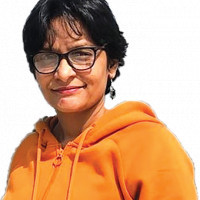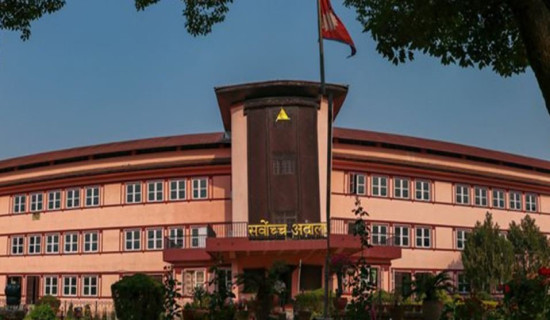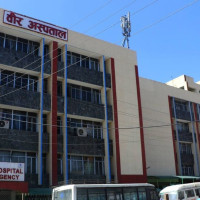- Tuesday, 3 March 2026
Sagarmatha Sambaad kicks off calling for global climate action
Kathmandu, May 17: Prime Minister KP Sharma Oli has said that the Sagarmatha Sambaad (Everest Dialogue) is being held as a global platform for discourse, inspired by the belief that protecting the Himalayas is essential to protecting the Earth, the oceans and humanity itself.
Speaking at the grand inaugural session of Sagarmatha Sambaad on Friday, organised for the first time by the Government of Nepal, Prime Minister Oli said the dialogue was born from a deep sense of interdependence.
The inaugural session was attended by ministers from several countries, political leaders and climate experts and activists from home and abroad.
The Sagarmatha Sambaad aims to foster sincere discussions, mutual knowledge exchange and collective action under the symbolic name of the world's highest peak, Sagarmatha.
The theme of the Sambaad is “Climate Change, Mountains and the Future of Humanity.
Prime Minister Oli said, “Our homes are being swept away by landslides. Floods and droughts strike without warning. Yet, we stand resilient. Our emissions are low, but our contributions to environmental protection are significant.”
Describing Nepal as more than a piece of geography, the Prime Minister called it a sacred land, “Where wisdom breathes through every stone and stream, where the spirit of awakening was born. From the land of Lord Buddha, a light emerged that continues to guide humanity toward peace and compassion.”
“Our tradition is rooted in listening with respect, speaking with sincerity and seeking truth together,” the Prime Minister said.
The Sambaad is a revival of that very spirit, a space where humility and reverence meet and where answers are sought with empathy, not ego, he added.
Quoting an ancient Sanskrit saying, translating to- through dialogue, truth shines, he stressed that in times of division, it is not silence or shouting, but honest conversation that helps.
The theme of the Sambaad is deeply personal to Nepal, Oli said. “This is not a distant issue for us, it is our daily reality. But it is not ours alone, it affects the whole world.”
He warned that though mountains may seem far, their role is vital. “They are the Earth’s water towers, our climate’s pulse and they are in danger.”
Prime Minister Oli also stressed Nepal’s role in climate action. He said, “Our emissions are negligible, yet we face the harshest impacts. Glaciers are melting, rains are uncertain, landslides and floods are becoming more frequent. Still, we stand firm.”
Nepal has pledged to achieve net-zero emissions by 2045, five years ahead of the global target and is advancing adaptation plans, greening its economy, and weaving sustainability into its national vision. “But we cannot do it alone,” he said.
“Climate change is a global emergency. It demands a global response, anchored in justice, rooted in responsibility and fuelled by solidarity. Climate justice must lead the way,” said the Prime Minister.
He called for greater attention to mountains in global climate discourse, saying they regulate climate, store water, recharge ecosystems and support biodiversity. “We need a bold, integrated vision, a ‘mountains-to-oceans’ approach.” He also urged special financing, tailored policies, clean energy investments and protection for vulnerable communities.
“Let us bridge ancient wisdom with modern innovation. This is how we build resilience and protect our shared future,” Prime Minister Oli said.
He called the global leaders to act with courage and care.
Foreign Minister Dr. Rana calls for collective action
Likewise, Minister for Foreign Affairs Dr. Arzu Rana Deuba highlighted the recent series of extreme weather events that have devastated lives and livelihoods across Nepal. Floods, glacial lake outbursts, droughts, water scarcity and forest fires have caused widespread suffering, she said.
She described mountains as global resources, storing freshwater, acting as carbon sinks and sheltering rich biodiversity. “They offer sustainable climate solutions in the form of reforestation, watershed protection and eco-tourism,” Minister Dr. Rana said,
She confirmed Nepal’s commitment to achieving net-zero emissions by 2045. Hydropower remains Nepal’s largest energy source, and its community forestry programme is a global model for participatory conservation, she said.
Minister Dr. Rana said the Sambaad offers a unique opportunity to reflect and engage in meaningful conversations, connecting mountains to seas and the Global North to the Global South.
PM unveiled NDC 3.0
On the first day of the Sambaad, the Prime Minister unveiled the country’s Third Nationally Determined Contribution (NDC 3.0) reaffirming its commitment to climate action, resilient and low-carbon future.
Prime Minister Oli handed over NDC 3.0 to Mukhtar Babayev, Minister of Ecology and Natural Resources of Azerbaijan and President of the 29th UN Climate Change Conference (COP 29), during the Sambaad.
The NDC 3.0, prepared by the Ministry of Forests and Environment in line with the Paris Agreement under the 21st UN Climate Change Conference (COP 21) framework of the United Nations Framework Convention on Climate Change (UNFCCC), was approved by the Cabinet meeting held on Wednesday.
Guterres’ video address
At the opening ceremony of the Sambaad, a video message from United Nations Secretary-General António Guterres was presented. In his address, he highlighted that global warming is accelerating the melting of mountains and negatively impacting the region's ecological systems. He shared that he witnessed these effects firsthand during his visit to Nepal.
“The world has much to learn from Nepal’s climate leadership, from local adaptation plans and early warning initiatives in partnership with the United Nations, to remarkable efforts in reforestation and bold steps toward achieving climate goals by 2045,” he said.
Likewise, speaking on the occasion, India’s Minister for Environment, Forest and Climate Change, Bhupender Yadav, said that mountainous countries and their residents could face increasingly complex environmental challenges in the future and stressed the need for mountain nations to unite and take joint action to address the climate crisis.
“Countries with higher carbon emissions have seriously neglected their commitments regarding climate finance, technology transfer, and capacity building, which has worsened the climate crisis. Their responsibility in this crisis must be comparatively greater,” he said.
Similarly, Xiao Qi, Vice Chair of the Thai Committee of the National People’s Congress of China, said that China would continue to play its role as a responsible major nation in mitigating climate change.
He said, “China must move forward in cooperation with Nepal and other Himalayan countries to improve ecological governance and prosperity, promote shared development and deepen learning from various civilisations for the future. China is ready to cooperate to build a sustainable future.”
Similarly, Mukhtar Babayev, COP29 Presidency and Representative of the President of the Republic of Azerbaijan on Climate Issues, said that political commitment is essential to ensure climate justice.
“To mitigate and adapt to the impacts of climate change, public funds must be mobilised, which will help address the irreversible losses and damages faced by states,” he said. “Various wealthy and developed nations have already presented clear roadmaps to mobilise US$ 1.3 trillion annually by 2035. Now, our focus must be on implementation. As the COP 29 Presidency, we will remain active in ensuring that donors fulfill their pledges. We will hold governments accountable so they can mobilise the necessary US$ 300 billion to implement this agenda.”
Mountains are vital climate regulators: Minister Shahi
Delivering a national statement at the Sambaad, Minister for Forests and Environment Ain Bahadur Shahi Thakuri warned that Nepal and the Himalayas are on the frontline of a fast-accelerating climate crisis.
“Our glaciers are shrinking, ecosystems are shifting and traditional lifestyles are under threat; this is a global crisis,” he said.
Highlighting Nepal’s responsibility as home to eight of the world’s 14 highest peaks, he said that the Himalayas, known as the ‘Third Pole’, provide freshwater, biodiversity and spiritual value to one-fifth of humanity.
Citing the IPCC’s Sixth Assessment Report, he said mountain regions are warming at twice the global average, triggering glacier retreat, floods, landslides and disrupted water systems. The three-day Sambaad saw the participation of 350 persons, among them 175 are from various countries, including high-level dignitaries from 12 countries.
Participants included representatives from 61 foreign and domestic organisations and institutions, including SAARC, BIMSTEC, the World Bank, the Asian Development Bank, development partners, universities, research centres, civil society and non-governmental organisations.
Later in the evening, Prime Minister Oli hosted a welcome dinner party for all the delegates.






-original-thumb.jpg)









